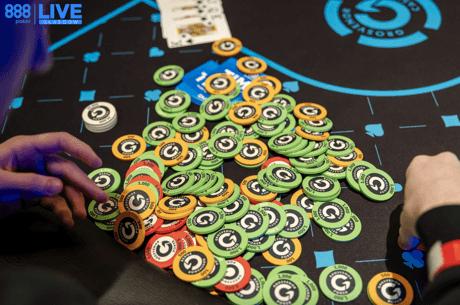Hand Review: Turning Kings Into a Bluff Deep in PSC Panama

Covering live poker tournaments for a living affords me the opportunity to see countless thousands of hands played out, many of which offer interesting and potentially valuable insights into how players — both amateurs and professionals — play the game. In this ongoing series, I'll highlight hands I've seen at the tournaments I've covered and see if we can glean anything useful from them.
The Scene
Back to hand reviews for this week, and we're going to look over a hand played by one of the very best. It's between Byron Kaverman and upstart Dominican player Alberto Meran Matias from deep in the PokerStars Championship Panama Main Event.
Just 20 players remained. Kaverman had been recently among the leaders but was down to a little under 800,000, while Matias had 330,000 at 5,000/10,000/1,000. Kaverman had been very active with preflop raises and three-bets from my memory, while I can't recall much about how Matias had been playing prior to this hand.
The Action
Matias opened to 25,000 in the cutoff, and the small blind called. Kaverman then made it 90,000 to go from the big blind, and Matias was the only customer.
The pair went heads up to the 7♣3♦8♠ flop, and Kaverman bet 45,000. Matias called after tanking for a few minutes. The A♦ hit on the turn and both players checked, then Kaverman checked again after the 4♥ river. Matias tanked a while once more, then moved all in for 195,000.
After about a minute, Kaverman splashed in chips to call. Matias turned over K♠K♦ but hit the rail when Kaverman showed A♣J♦.
Concept and Analysis
I thought this was kind of a strange hand all around, so I made a note to myself after posting it to go back and give it another look.
It starts off with Matias opening pocket kings and getting one caller. before Kaverman — who had been playing table captain — came out three-betting. His three-bet seems pretty in line with how he was playing overall, but Matias had a monster.
Matias's decision to flat rather than four-bet is an interesting one, but one I don't mind at all. Flatting with monsters in position can be a very profitable play, and he had over 30 big blinds. He doesn't know Kaverman has a legitimate hand, and if Kaverman is just trying to run him over, it's good to give him that chance.
Plus, in the worst-case scenario where an ace flops, Matias has position and can try to control the size of the pot.

In fact, the flop is quite friendly for Matias, coming 7♣3♦8♠. Kaverman chooses to bet tiny, just 45,000 into a pot of a little under 250,000. I'm not really sure what to make of this bet, as Kaverman might not fold out AxQx or AxKx — though Matias would likely have jammed the latter preflop — and overpairs will surely continue.
One possible benefit could be building the pot for a bluff shove on the turn to try to fold out weak overpairs. Since this is Byron Kaverman we're talking about, I'm guessing he had sound reasoning.
As for Matias, I think I prefer just to shove on this flop. It's a little bit awkward, but his hand is disguised and it gets max value when Kaverman has weaker overpairs. Flatting seems fine, too, since the only really bad cards are, well...
...the dreaded ace that hits the turn. It checks through, which seems ideal for both players, and the board then completes with a brick. Now Kaverman checks again. He could certainly bet small again for value, but he opts to check, which brings up the most curious decision of the hand.
Matias decides to jam the river after tanking for awhile. This is the one decision that I can't really make much sense of. The thing about kings in this spot, is it seems like everything better calls you, and everything worse folds.
Clearly, this has to be a bluff, but what is he trying to fold out? Kaverman's betting pattern says he either has an overpair that Matias beats, a strong hand like AxKx, or aces that Kaverman would rather try to induce with if he thinks Matias can't call a bet.
Kaverman does find the call, and it doesn't take him long to do so. A solid read on the situation by him, correctly realizing his opponent was turning a pair into a bluff.
I think there's some merit to turning hands like jacks and tens into a bluff here to try to get Kaverman to fold kings and queens. But otherwise, this seems like a strange ending to a strange hand that stuck out in my memory from this event.










